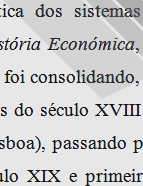

................................
The content of the course and its innovative nature within the Portuguese historiographical context of that time can be evaluated through the book authored by Professor Charles Verlinden himself: Introduction à l` Histoire Économique Génerale (1948) and the concise article dedicated to it by T. de S. Soares (Torquato de Sousa Soares, "Um curso de História Económica..." ["An Economic History course] , 1947, pp. 671-674). This initiative continued in the academic years 1949/1950 and 1950/1951 through two courses and two conferences by Yves Renouard (1908-1965), Director of the Faculty of Letters of the University of Bordeaux, on medieval economic and social history (João Paulo Nunes, Op. Cit., pp. 60-61). Additionally, at the level of research and historiographical production, some innovation had been reaching Portugal since the late 1940s. As A. H. de Oliveira Marques aptly noted: "The generation of 1939-45 was guided, as expressly acknowledged by almost all representatives, by the French school around the Annales journal. As open disciples of Lucien Febvre [1878-1956] and Marc Bloch [1886-1944] (with whom António Sérgio was associated in Portugal, not as a historian but rather as a critic), they advocated a total, integrated history, which would draw on various genres of historical research to understand the models of a society" (Oliveira Marques, Antologia..., vol. I, 1974. pp. 48-49). Due to space constraints, not all the historians who contributed to the revitalisation of our historiography from post-World War II until 1974 have been analysed herein, however it is worth noting some of the more prominent figures in this process spanning approximately three decades, some within the scope of the university and others in an extra-university context. António Sérgio de Sousa (1883-1969) studied at the Military College, the Polytechnic School, and the Naval School. He served as a Navy officer (1904-1910) and led a peripatetic life, residing in various countries for work purposes (England, Switzerland, France, Spain, and Brazil), or as an exile. He applied for teaching positions at the Faculty of Letters of the University of Lisbon (1912) and, again, at the Faculty of Letters of the University of Coimbra (1933), but was not successful. Notwithstanding the latter Faculty Council's favourable vote to hire him, this was prevented by the authorities. He was a persistent critic of the Estado Novo regime and its opponent through various means, having been imprisoned several times.
